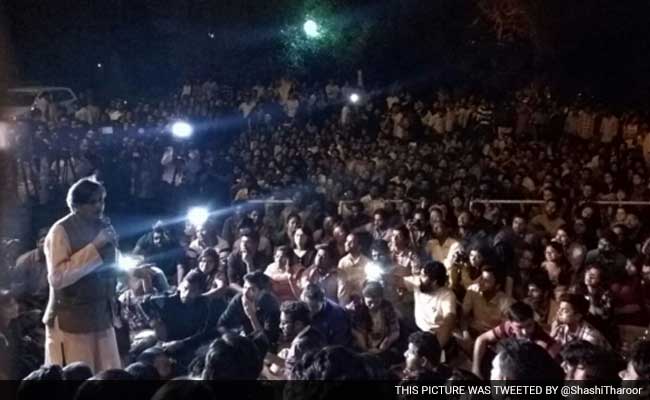My speech, which lasted for 37 minutes and was followed by a question-and-answer session that took in the queries of nearly a dozen students, can be found here.
As will be apparent to anyone who has the patience to listen, it was neither inflammatory nor seditious in either tone or content, but an exposition of my deeply-held views about the idea of Indian nationalism, which I have articulated in numerous books and articles over the last three decades.
I explained to the JNU students that my idea of India is of one land embracing many. The Indian idea is that a nation may endure differences of caste, creed, colour, conviction, culture, cuisine, costume and custom, and still rally around a consensus. And that consensus is around the simple idea that in a democracy you don't really need to agree - except on the ground rules of how you will disagree.
My idea of India celebrates diversity, but our ruling party prefers uniformity, built on a triad of Hindi-Hindu-Hindustan, all of which are essential to India but not sufficient to exhaust the idea of Indianness. In doing so, I pointed out, they are undermining the basic ethos of Indian democracy, which recognises the nation's diversity and celebrates multiple ways of being Indian.
The BJP and its fellow travellers have also made something of a fetish of nationalism as the major issue in the country today, especially in the wake of the disloyal and supposedly seditious slogans shouted at JNU last month. I informed the students of my efforts to amend the law on sedition, through a private member's bill that (unlike my bill on Section 377) has been successfully introduced in Parliament.
"Anti-national" is a label too easily applied to anyone who chooses not to conform to the BJP's view of Indianness. Chanting "Bharat Mata ki Jai" has become the latest acid test of Indian nationalism. I argued that no Indian should be compelled to mouth a form of nationalism he does not feel.

Congress leader Shashi Tharoor speaking at JNU on Sunday
Some of our print media covered these points fairly. But some of the TV channels, obsessed by marginalia that can be whipped into controversy in their relentless quest for TRPs, ignored the entire substantive content of my speech. They chose instead to focus on a throwaway comment I made in response to prodding from a member of the audience, in which I remarked that Kanhaiya Kumar is the Bhagat Singh of our times.
My allusion was to the simple fact that both men are (or were) Marxists in their 20s who are/were passionate about their country in its broadest and most inclusive sense. Obviously, historical eras are different, and the parallels end there. The comment was not central to my argument at all, and was not taken as such by any of the students listening to me.
But I did not reckon with the frenzy that the TV channels would unleash. The cacophony on my allegedly "demeaning" a nationalist hero drowned out the serious debate about nationalism I had hoped to embark upon - between an idea of the nation that embraces the widest possible range of beliefs and diversities, and one that demands conformity to a narrow interpretation of what constitutes Indianness. That is at the heart of the contestations about nationalism at JNU today. It remains worth discussing.
But Indian democracy is ill-served by a popular media that is not interested in debate or deliberative discussion, only in the heady and immediate gratification of "breaking news" sensationalism. They may raise their TRPs, but in the process they will leave us poorer as a society and a polity, our citizenry less informed about the vital choices facing them.
I began my talk by telling the JNU students: "You may have come here for education but you are also educating the nation. What is happening here has given the whole nation an education on the vital issues of dissent and democracy, sedition and, of course, 'azaadi' (freedom)."
Unfortunately, for the value of that education to reach the bulk of Indians, it needs to be imparted first to the purveyors of bilge on our television channels. Unless the voices of those calling for a humane and broad-minded view of the Indian nation are heard, we are in danger of being reduced to the very thing our forefathers rejected in 1947 - a Hindu Pakistan. By taking the public's minds off the real issues and drowning them in trivia, our television anchors would be complicit in that betrayal. The narrow-minded India that would leave us with would not be the country that Mahatma Gandhi, Jawaharlal Nehru, Maulana Azad - and Bhagat Singh! - fought to free.
(Dr Shashi Tharoor is a two-time MP from Thiruvananthapuram, the Chairman of the Parliamentary Standing Committee on External Affairs, the former Union Minister of State for External Affairs and Human Resource Development and the former UN Under-Secretary-General. He has written 15 books, including, most recently, India Shastra: Reflections On the Nation in Our Time.)
Disclaimer: The opinions expressed within this article are the personal opinions of the author. The facts and opinions appearing in the article do not reflect the views of NDTV and NDTV does not assume any responsibility or liability for the same.


